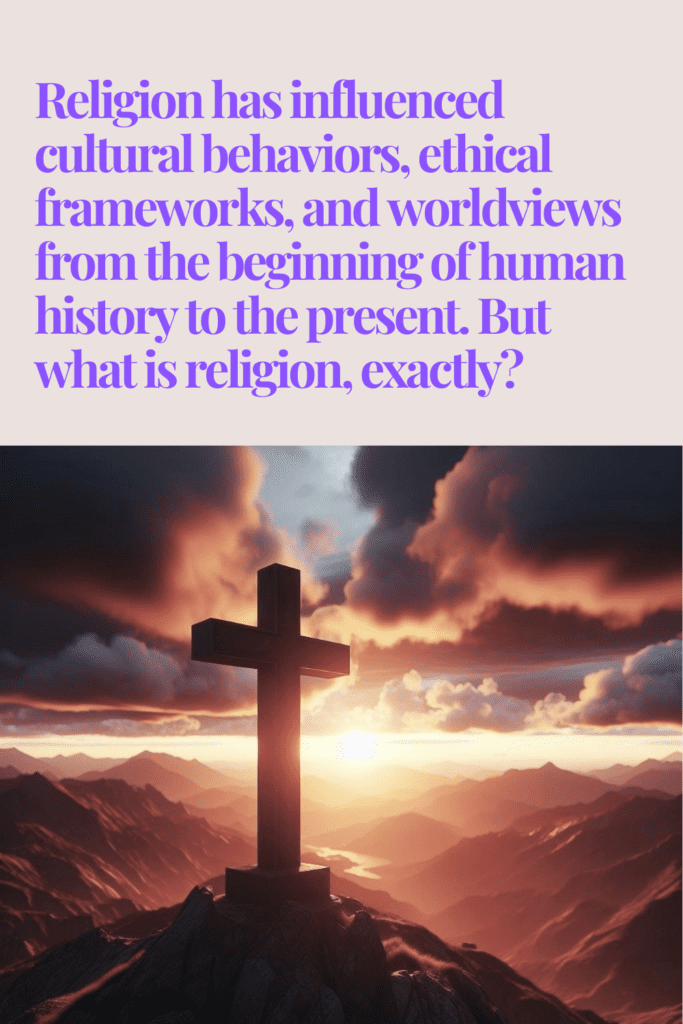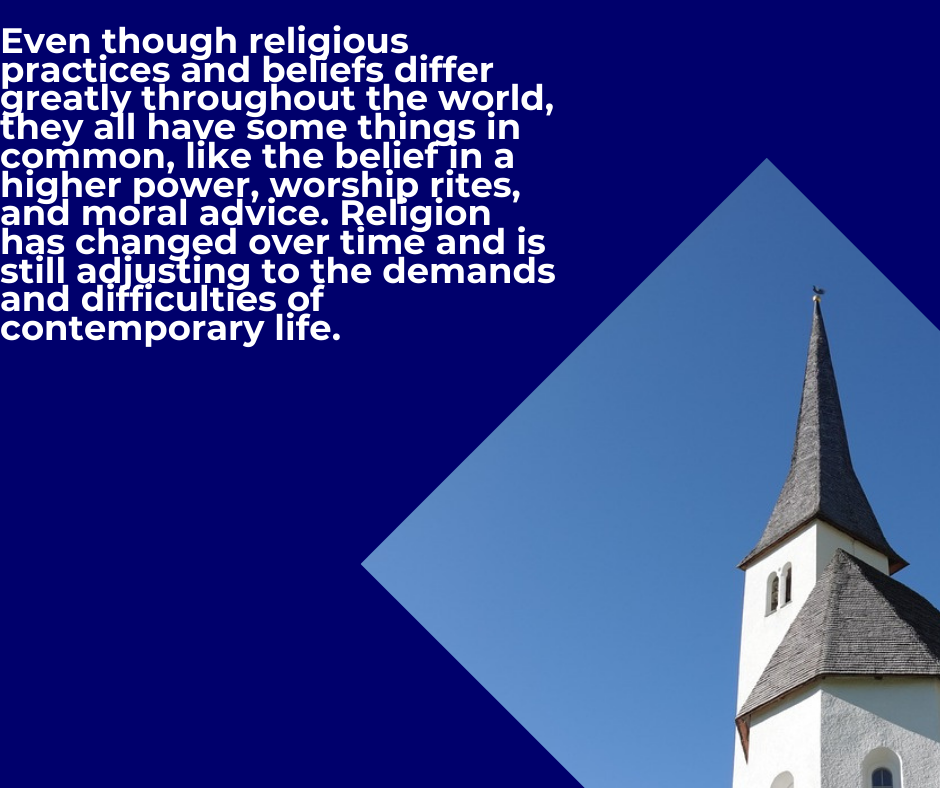What is Religion among the most fundamental and ubiquitous elements of human life. Its effects on people, societies, and cultures are profound and extensive. Religion has influenced cultural behaviors, ethical frameworks, and worldviews from the beginning of human history to the present. But what is religion, exactly? We must examine this question’s many definitions, elements, and functions in human life.
Table of Contents

The Definition What is Religion
Religion is fundamentally a set of ideas, customs, and rituals that revolve on the veneration of a higher power or powers, usually a deity or deities. It is a way for people and groups to try to figure out what life is all about, what the ultimate nature of existence is, and where they fit into the cosmos. The majority of definitions of religion have some characteristics in common, even though there isn’t a single, widely recognized definition.
• Belief in a Higher Power or Divine Force: The majority of faiths hold that there is a transcendent force or entity, which could be an impersonal cosmic force, a pantheon of gods, or a personal God.
• Sacred Texts or Teachings: Sacred texts, scriptures, or oral traditions are frequently found in religions and convey the moral precepts, history, and teachings of the faith.
Religious activities frequently entail acts of worship and rituals that demonstrate awe and devotion to the divine. These routines could involve meditation, fasting, prayer, pilgrimage, and other devotional activities.
• Moral and Ethical Guidelines: Generally speaking, religion offers a moral framework for how people ought to conduct themselves, interact with others, and define what behavior is right and wrong.
• Community and Belonging: People who practice religion frequently gather together to celebrate religious holidays, share their beliefs, and encourage one another on their spiritual paths.
These constitute the fundamental features of the majority of religious systems worldwide. However, different cultures and religious traditions may have very varied ways of expressing and practicing these characteristics.
The Diversity of Religion
Religion is not a singular idea. Around the world, it takes many diverse forms, with varying organizational structures, beliefs, and practices. Among the most prevalent what is religions in the world are:
• Christianity: This religion, which is founded on the teachings of Jesus Christ, places a strong emphasis on the idea that there is only one God and that people are saved by trust in Jesus. It encompasses several different denominations, including as Eastern Orthodoxy, Protestantism, and Roman Catholicism.
• Islam: Islam is based on the teachings of the Prophet Muhammad and the conviction that there is only one God, Allah. The Quran is regarded as God’s last and most comprehensive revelation. Islam places a strong emphasis on living according to Sharia law and submitting to God’s will.
• Hinduism: One of the world’s oldest religions, Hinduism is distinguished by its belief in a wide variety of gods and a supreme reality (Brahman). It encompasses a range of ideologies, methods, and routes to emancipation, including bhakti (devotion), jnana (knowledge), and karma (selfless deeds).
• Buddhism: This spiritual system, which was founded by Siddhartha Gautama (the Buddha), emphasizes the Four Noble Truths and the Eightfold Path as a way to achieve enlightenment (nirvana) and put an end to suffering. It stresses self-realization and meditation rather than a particular deity.
• Judaism: Based on the idea that there is only one God and that God and the Jewish people have a covenant, Judaism is one of the oldest monotheistic religions. It is focused on following Jewish law (Halakha) and the Hebrew Bible (Tanakh).
• Indigenous Religions: A strong bond with nature, ancestors, and spirits is frequently the foundation of the belief systems of many indigenous societies worldwide. These customs are varied and usually focus on ceremonies and activities that respect the planet and its cycles.
There are innumerable other religious traditions, ideologies, and spiritual practices in addition to these major religions, each having its own distinct worldview and conception of the sacred or divine.
The Functions of Religion
what is Religion plays a variety of roles in people’s lives and in society at large. These roles fall into three general categories: psychological, social, and cultural.
1. Psychological Functions
Many people find comfort, meaning, and purpose in their religious convictions. It offers solutions to existential questions such as:
• Why are we here? for many people.
• What happens when we die?
• What makes a life worthwhile? Because religion offers a framework for understanding the world and one’s place in it, it helps people feel less uncertain, worried, and hopeless. It provides consolation and hope, especially in trying or sad circumstances. For example, believing in a hereafter or in the possibility of divine intervention can provide people confidence and solace in difficult situations.
2. Social Functions
Religion plays a significant role in fostering and maintaining social cohesion. Because followers usually share similar rituals, values, and beliefs, it creates a sense of community and belonging. Religious institutions have the ability to facilitate communal worship, foster social ties, and provide support networks. Additionally, they serve as a conduit for the transmission of cultural beliefs and traditions from one generation to the next. Additionally, religious institutions regularly fund charitable and social justice projects that tackle issues like injustice, poverty, and human rights. For example, many religious organizations run schools, hospitals, and orphanages in addition to providing disaster relief and humanitarian aid to those in need.
3. Cultural Functions
Religion also shapes the cultural identity of societies. It influences literature, music, art, and architecture and often serves as a source of inspiration for artistic expression. what is Religious festivals and holidays mark important cultural turning points and provide opportunities for communal celebration. Religious practices and beliefs can also have an impact on laws and social standards. Many legal systems, for instance, are based on moral principles that can be found in religion teachings, such as the prohibition against murder and theft. People’s attitudes and behaviors within a society are influenced by their religious views regarding justice, morality, and the nature of good and evil.
The Evolution of what is Religion
Throughout history, religion has changed, and it still does in the present day. Religious ideas were frequently strongly linked to nature in the early phases of human civilization, with many societies being dominated by animistic or polytheistic beliefs. With an emphasis on a single, all-powerful deity, monotheistic faiths started to appear as societies grew more sophisticated. Sacred books were collected to aid followers in their spiritual quests, and religious organizations grew increasingly structured over time.
Religion has encountered unprecedented difficulties in the modern era, especially in light of globalization, secularization, and scientific breakthroughs. Many people have begun to doubt conventional religious beliefs as a result of the growth of reason, logic, and scientific research. In reaction to these developments, religious movements have also arisen; some stress the need for a return to traditional faith, while others want to bring science and religion together.
In many parts of the world, especially in Western nations, secularization—the process by which religion loses its influence over public and political life—has been a major trend. But in many parts of the world, religion is still very much in control, and new religious movements are always starting up in response to shifting social, political, and cultural conditions.
What is Religion and Modern Society
Despite the difficulties presented by modernity and atheism, religion nevertheless has a big influence in today’s interconnected and worldwide society. Religion continues to play a significant role in the lives of billions of people worldwide, despite the fact that the number of people who are not religiously affiliated has increased, especially in the West. It still has an impact on world politics, shapes personal lives, and offers a framework for comprehending the world.
Another important aspect of the modern world is religious pluralism, or the coexistence of several religions within a society. People from various religious origins coexist in many nations, and interfaith communication is becoming more and more crucial to promoting respect and understanding between them.
Whether it takes the shape of activity driven by religious convictions, religious fundamentalism, or liberation theology, religion continues to be a major force behind social and political movements. Discussions about topics like social justice, climate change, and human rights are nevertheless influenced by religious convictions.
Conclusion
To sum up, religion is a complicated and multidimensional phenomena that has a significant impact on both individual and societal lives. In addition to forming social, ethical, and cultural frameworks, it offers community, meaning, and purpose. Even though religious practices and beliefs differ greatly throughout the world, they all have some things in common, like the belief in a higher power, worship rites, and moral advice.
what is Religion has changed over time and is still adjusting to the demands and difficulties of contemporary life. Religion is still a vital component of the human experience, offering answers to some of the most important questions in life, regardless of whether it is practiced traditionally or in more customized ways.
